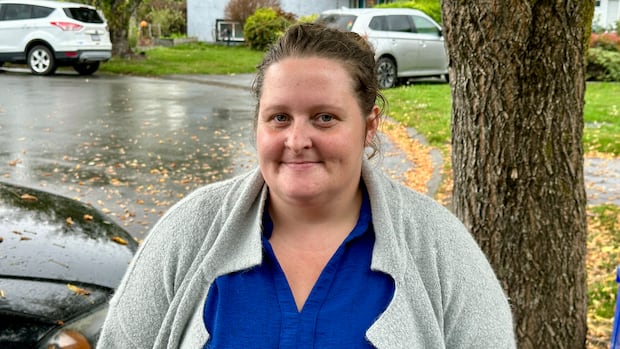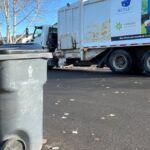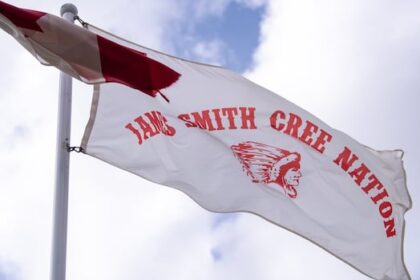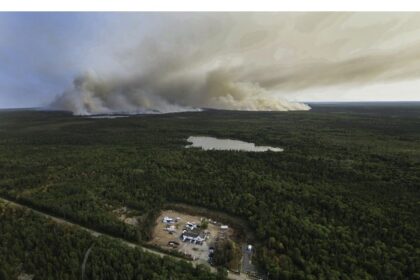British ColumbiaSeveral communities on Vancouver Island struggle each year with providing shelter for people without a home when it gets cold and wet — leaving some of the region’s most vulnerable people at risk of dying of cold. Concerns about winter shelters include public drug use, theft and loiteringMaryse Zeidler · CBC News · Posted: Oct 21, 2025 9:00 AM EDT | Last Updated: October 21Sidney resident April Lushaw lives in her car. She recently spoke out at a public hearing in support of rezoning a property for it to become an emergency weather response shelter. (Kathryn Marlow/CBC)As far as home tours go, a look around April Lushaw’s residence doesn’t take long. Lushaw lives in Sidney, B.C., a quiet seaside community of about 12,000 residents 30 kilometres north of Victoria. Her home is a Jeep Liberty, which she uses to get around, store her belongings, and sleep in at night. “I am fortunate enough to live in a vehicle,” Lushaw said, despite the mould that clings to some of her possessions and the cold that seeps into her bones at night. Lushaw said she has been without a home since August 2024, when her roommate situation didn’t work out. She says it’s hard for her to find a place to rent because she lives on disability assistance and has a daughter, who currently lives with her in-laws. WATCH | This B.C. woman can’t afford rent. Here’s the vehicle she lives in instead:This B.C. woman can’t afford rent. Here’s the vehicle she lives in insteadSidney, B.C., resident April Lushaw lives in her vehicle because she can’t find a place to rent. She describes what life is like living in a vehicle.Last month, Lushaw shared her perspective at a public hearing to determine the fate of an extreme weather response shelter in Sidney that would operate on nights when the temperature dips below a certain level. “It would mean that I would have a warm meal and I could get out of my damp vehicle for a night,” Lushaw says.After significant community outcry, partly because of the shelter’s location in a seniors’ centre, councillors recently decided against rezoning the property to accommodate a winter shelter. Sidney Mayor Cliff McNeil-Smith said homeless people are members of the community, but public opposition to the shelter was too great to ignore. Sidney, B.C., is a seaside community about 30 kilometres north of Victoria. (Kathryn Marlow/CBC)Sidney is one of several communities on Vancouver Island that struggle each year with providing shelter for people without a home when it gets cold and wet. Community feedback at council meetings has included concerns about winter shelters, such as drug use, drug sales and drug paraphernalia left behind, as well as unease about theft and undesirable people added to a neighbourhood. The province offers two types of support for local governments: funding for temporary winter shelters, which are usually open seven days a week from October to April, and emergency weather response shelters, which only open on nights when the weather meets criteria determined by the community. B.C.’s Ministry of Housing says last winter it provided funding for 6,665 shelter spaces in communities throughout the province, a 20 per cent increase in available spaces compared to the previous year. But it’s up to communities to decide if they want to have a shelter. As the province points out, that isn’t always simple. In a statement to CBC News, a ministry spokesperson said there are many factors a community might weigh, including if there is a non-profit to run a shelter, and local zoning.In some cases, local governments use assets like community centres to provide winter shelters. But the mix of homeless people and recreational programming for children and seniors in the same space often results in a clash, leaving officials with few or no spaces to work with. Conversely, homeless advocates say rules put in place to limit where winter shelters can be located make it virtually impossible to secure a space and funding — leaving some of the community’s most vulnerable people at risk of dying of cold.Read more stories from Vancouver IslandLong winter aheadSuch is the case in Campbell River, where a drop-in space that provided 20 beds in winter closed earlier this year as part of the city’s plans to revitalize the downtown core. Kwesa Place and the Həm’ʔaelas Community Kitchen were managed by Shawn Decaire, a community worker with Indigenous-led Laichwiltach Family Life Society.“It was something that was huge to a lot of our clients,” Decaire said.“They lost their place where they could be safe. They lost their place where there was no stigmatism.”Shawn Decaire is a community worker with the Indigenous-led Laichwiltach Family Life Society in Campbell River. He used to manage Kwesa Place and the Həm’ʔaelas Community Kitchen until they were forced to shut down earlier this year. (Maryse Zeidler/CBC)The city is planning to tear down and redevelop the building that housed Kwesa Place and the community kitchen. But the city also changed its zoning bylaws to restrict social services like shelters to a limited area of the downtown core. Decaire says the restriction has made it virtually impossible to find a place to lease. The City of Campbell River has previously told CBC News that social service providers are welcome to apply to rezone a space if a suitable one is found, but Decaire said that is a considerable effort that is unlikely to succeed. Campbell River, B.C., is known to some as the gateway to northern Vancouver Island. (Maryse Zeidler/CBC)Decaire said there has been an uptick in social disorder and overdose deaths since Kwesa Place closed. Now, he worries about the cold months to come. “Before Kwesa had opened, we had seen every year a homeless person die of hypothermia,” he says. “We’re looking at seeing it again for sure.”The city does provide an emergency warming shelter under its emergency management guidelines. Last year it opened at a local community centre from 10 p.m. to 7 a.m. when temperatures dipped below -4 C. WATCH | In Parksville, outreach workers say the city is delaying approval of a cold weather shelter:Outreach workers say the city is delaying approval of cold weather shelters as winter approachesWith the weather getting colder, a local non-profit is preparing to open a warming centre and shelter in Parksville, B.C. on Vancouver Island. But as Claire Palmer reports, outreach workers say the city is resisting the initiative.‘This problem isn’t going anywhere’Despite ongoing challenges, some communities have found a way to succeed. After several years of grappling with finding a winter shelter, emergency management leader Ryan Wainwright is confident the Cowichan Valley Regional District has finally found the right solution, in collaboration with the City of Duncan and Municipality of North Cowichan.“It’s very clear that this problem isn’t going anywhere for local government,” Wainwright said. “Provincial solutions, federal solutions may be years to decades down the road.”In previous years, the district operated an emergency warming centre out of a community centre in Duncan. But residents frequently told the district that they felt the service conflicted with youth programming, in particular.Last year, the district used the parking lot of a closed hotel off Highway 1, which Wainwright says was an improvement. This year the district determined that operating a winter shelter seven days a week, with a surge capacity during more extreme cold, was more suitable. To find the space, the district hired a consulting company to map out the community to ensure a shelter wouldn’t be located in areas next to services like daycares or seniors’ centres. Wainwright says the benefit of working with B.C. Housing isn’t purely financial. He believes it also helps to show the need to support homeless people in the community. “These folks are members of our community and they’re part of our society,” he says.“We are talking about — even in a place that is as lovely and mild as Vancouver Island — the difference between people freezing to death and not freezing to death.”ABOUT THE AUTHORMaryse Zeidler is an award-winning reporter who covers news from Nanaimo and north Vancouver Island. Have a news tip? You can reach her at maryse.zeidler@cbc.ca.With files from Kathryn Marlow
Homeless people on Vancouver Island need winter shelter. So why is it so hard to supply each year?











